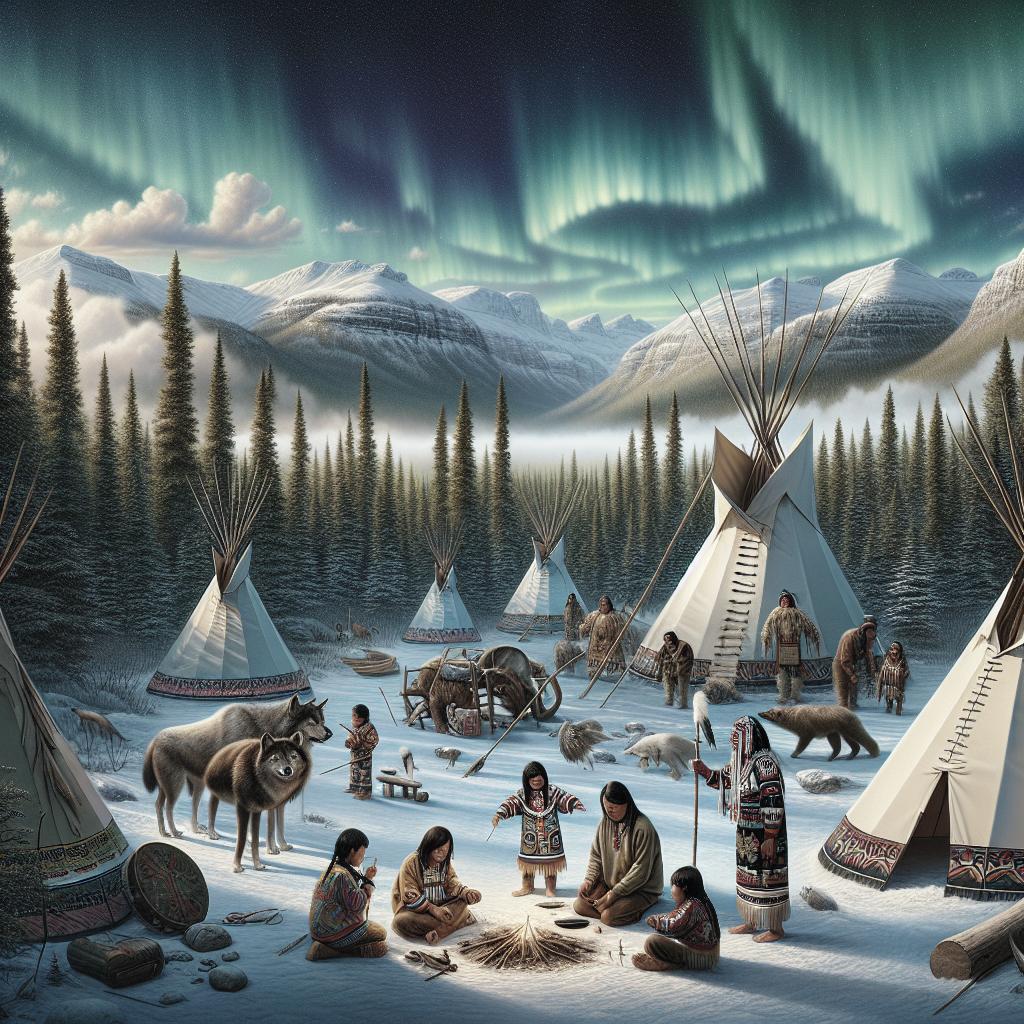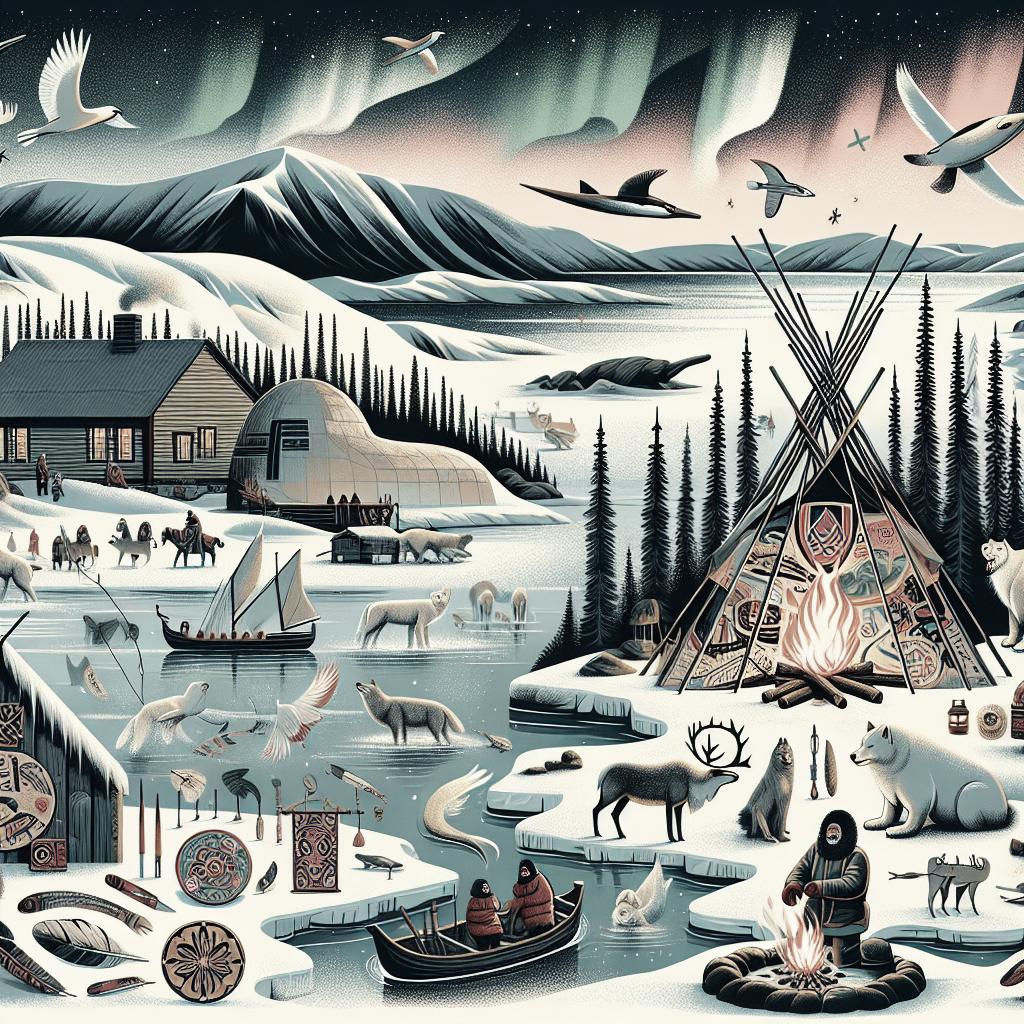“`html
Indigenous Communities in Northwest Territories
The Northwest Territories of Canada, known for their breathtaking landscapes and rich cultural heritage, are home to diverse indigenous communities. With distinct populations, varying settlement patterns, and unique economic practices shaping their existence, these communities continue to thrive amidst challenges. From agriculture and fishing to natural resource management, the indigenous peoples of the Northwest Territories possess a wealth of knowledge and adaptive strategies. This article delves into the nuances of these communities, covering population dynamics, settlement trends, and economic pursuits. We explore key sectors, including agriculture, resources, and services, shedding light on their significance. Through a deep dive into transportation and the prominent First Nations, we aim to paint a vivid picture of life in the Northwest Territories, celebrating their resilience and cultural wealth.
Thank you for your submission
This article aims to highlight the vibrant lives of indigenous communities residing in the Northwest Territories. By exploring various facets of their existence, we extend our gratitude for their contributions to the cultural fabric of Canada. Though often facing significant challenges, these communities exhibit resilience and creativity in preserving their traditions and environment. It is with appreciation that we share this submission, aiming to amplify their voices and stories.
The narratives of indigenous peoples provide a window into a world where community ties and respect for nature are paramount. By offering insights into their ways of life, this blog serves as a humble tribute to their endless contributions in shaping a richer, more inclusive world narrative.
Population composition
Indigenous communities in the Northwest Territories possess a rich tapestry of cultures and languages. Predominantly, the region is home to First Nations, Métis, and Inuit populations, each with unique traditions and histories. The intricate social fabric is woven through shared experiences and interactions over centuries, contributing to the territory’s cultural vitality.
The demographic composition is continually evolving, influenced by factors such as migration, birth rates, and socio-economic conditions. This dynamic interplay highlights the resilience and adaptability of these communities, forging pathways for cultural preservation amidst a rapidly changing world. Emphasizing the significance of these demographics offers a deeper understanding of the territorial identity.
Settlement patterns
Settlement patterns of indigenous communities in the Northwest Territories reflect a profound connection with the land. Traditional settlements are often situated near water bodies, reflecting reliance on fishing and transport. These communities have developed intricate knowledge of local ecosystems, which influences their settlement choices.
Recently, there has been a shift towards urbanized areas, largely driven by economic opportunities and educational access. However, this shift often presents challenges, such as cultural integration and resource allocation. Understanding these patterns underscores the ongoing negotiations between preserving traditional ways and adapting to modern necessities.
Economy
The economy of the Northwest Territories is a mosaic of traditional practices and modern enterprises. Indigenous communities leverage natural resources alongside contemporary trades, fostering a multifaceted economic landscape. Traditional knowledge plays a pivotal role in sustainable resource use, creating symbiotic relationships with the environment.
Moreover, economic empowerment initiatives strive to integrate indigenous voices into decision-making processes. Collaborative projects aim to balance economic growth with cultural integrity, demonstrating innovative approaches to development. Ecotourism and traditional crafts emerge as significant contributors, supporting cultural continuity and economic vitality.
Agriculture, forestry, hunting, and fishing
Agriculture, forestry, hunting, and fishing form the backbone of many indigenous communities’ livelihoods. These practices not only supply essential resources but also reinforce cultural practices passed down through generations. Hunting and fishing, in particular, are deeply rooted in traditional ways of life, ensuring food security and cultural heritage.
Efforts to modernize and enhance these sectors through sustainable practices are underway. Educational programs and technology integration aim to ensure these industries’ survival in line with environmental stewardship. By merging traditional wisdom with modern techniques, these communities strive to safeguard their cultural legacies.
Resources and power
The resource-rich lands of the Northwest Territories are a critical component of the local economy. Indigenous communities have historically managed these resources, guided by principles of sustainability and respect for the land. Collaboration with external entities aims to balance resource extraction with community welfare, emphasizing the importance of indigenous perspectives.
Power generation and management within these territories also represent a blend of traditional and modern systems. Renewable energy projects reflect a forward-thinking approach, harnessing natural elements for sustainable power solutions. These forward strides embody a commitment to environmentally friendly practices that honor indigenous stewardship ideals.
Services and labour
Services and labor form integral aspects of the Northwest Territories’ economic landscape. Indigenous peoples actively participate in sectors such as education, healthcare, and public administration, contributing to community development. These roles not only provide economic opportunities but also enhance communal well-being.
Efforts to promote indigenous participation in skilled trades and professional fields are met with enthusiasm, highlighting the desire for diversified skill sets. Training programs and educational initiatives cater to this ambition, cultivating a robust workforce equipped to meet contemporary challenges. The nurturing of local expertise ensures community self-reliance and growth.
Transportation
Transportation is vital for connecting remote communities across the vast expanses of the Northwest Territories. Traditional routes, often centered around waterways and trails, have evolved into modern networks. Winter roads and air travel supplement these pathways, ensuring the movement of goods and people.
Investment in infrastructure development reflects the increasing importance of connectivity. Enhanced transportation facilitates trade, cultural exchange, and access to essential services, reinforcing community resilience. Balancing infrastructural advancements with environmental considerations remains pivotal in planning for future growth.
First Nations in the Northwest Territories
The First Nations of the Northwest Territories encompass diverse groups, each with distinct cultural identities and traditions. Communities such as the Dene and Gwich’in express their identities through storytelling, art, and ceremonies, forming deep connections to their ancestral lands. Language and lineage play crucial roles in maintaining cultural continuity amidst external influences.
Political representation and treaty negotiations highlight efforts to safeguard their rights and autonomy. These processes illustrate a broader movement towards recognizing and respecting indigenous sovereignty, aiming for equitable governance and land management. The strength and resilience of the First Nations reflect their unwavering commitment to cultural survival and self-determination.
Summary of main points
| Section | Details |
|---|---|
| Thank you for your submission | Acknowledgment of the communities’ contributions and narratives. |
| Population composition | Discussion on First Nations, Métis, and Inuit populations. |
| Settlement patterns | Traditional and emerging settlement trends in the territory. |
| Economy | Diverse economic activities balancing tradition and modernity. |
| Agriculture, forestry, hunting, and fishing | Core practices rooted in cultural and environmental contexts. |
| Resources and power | Resource management reflecting indigenous ecological wisdom. |
| Services and labour | Community involvement in service industries and skill development. |
| Transportation | Developing transportation networks for community and economic growth. |
| First Nations in the Northwest Territories | Cultural and political dimensions of First Nations in the region. |
“`

